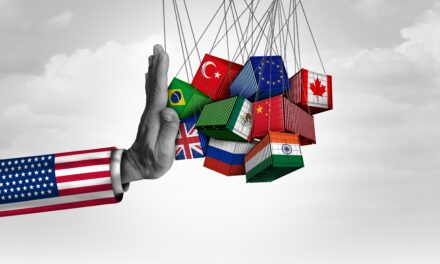Facing possible crippling tariffs U.S. President Donald Trump is threatening to impose on the United States’ biggest trading partner, Mexican President Andrés Manuel López Obrador has responded with calm and calls for continued friendship, and avoided strong language that could cause the dispute to deteriorate.
He wants dialogue, not a Twitter spat, and much less a trade war with the country that buys 80% of Mexican exports. Mexicans have seen enough Trump tweets not to think the sky is falling even at this latest threat, and while some might wish their president would take a couple of swings at a figurative Trump pinata, most seemed to think López Obrador was taking the right approach in trying to head off the tariffs.
“We do not want conflict, a war. Let us avoid that,” said Gilberto Lozoya, a 26-year-old in the northern city of Nuevo Laredo, across the border from Laredo, Texas, who works for a factory that exports boilers for U.S. brands like Whirlpool.
The business stands to take a hit if the tariffs, starting at 5% and rising as high as 25%, take effect on a Monday deadline Trump has given Mexico for slowing irregular migration through its territory. And while Lozoya feels his country could probably do more on that issue, he believes things are in good hands with López Obrador.
“The way the president has responded is very good,” Lozoya said. “He is a very sensible person.”
The Mexican government, which has struggled to cope with large numbers of mostly Central American migrants, has not publicly proposed any new policies, instead seeming to opt for a strategy of convincing Washington that it is already doing its part on migration.
Under López Obrador, who took office Dec. 1, Mexico has increased deportations and highway checkpoints in the south while raiding migrants traveling in a large caravan and atop freight trains. It has also insisted that human rights are at the core of its policy, and said it won’t criminalize migration.
Where previous President Enrique Peña Nieto was roundly criticized for not taking a more forceful line in responding to then-candidate and later President Trump, López Obrador does not seem to have suffered significant backlash over his handling of the latest tiff between the North American neighbors.
A poll tracking his day-to-day popularity saw it rise about four points from Trump’s announcement May 27 to nearly two-thirds approval as of Tuesday. And on Sunday, voters handed López Obrador’s Morena party the governorships in two states with significant trade ties to the United States — Puebla, home to a Volkswagen plant, and Baja California, which borders California and is dotted with manufacturing and assembly plants known as “maquiladoras.”
Index, a national business chamber representing export manufacturers, said in a recent statement that it fully supports the Cabinet-level Mexican delegation that travelled to Washington to negotiate, while urging officials to take action on immigration issues that Trump has complained about. It also called on negotiators to separate trade from immigration.
Isidro Morales, a political scientist at the Monterrey Institute of Technology and Higher Education, said it was astonishing that trade threats would be used as leverage to force Mexico on the unrelated issue of migration. He complained that Trump “is creating an environment of uncertainty.”
Morales called on the president himself to visit the U.S. to make his case if necessary to defend a new trade deal that would replace the North American Free Trade Agreement if ratified by U.S., Mexican and Canadian lawmakers.
“He has to be very, very tough, or rather very ‘firm’ is the word, in saying Mexico cannot tolerate commercial blackmail being linked to immigration policy,” Morales said, adding that he sees a good chance the tariffs won’t happen because the outcry from U.S. business interests would be too great.
That’s not to say the Mexican president doesn’t have his critics. Plenty of Mexicans feel they are a political punching bag as Trump repeatedly hits the country on Twitter, calling it “an ‘abuser’ of the United States, taking but never giving,” and saying Mexicans can stop illegal immigration easily “if they want.”
Alejandro Sánchez, who runs a newsstand on Mexico City’s stately Reforma Avenue, considers López Obrador’s response to have been tepid and believes that if Trump won’t listen to reason, Mexico’s president should be more forceful.
“Maybe I don’t know much about politics, but we are letting ourselves be jerked around a lot by the U.S. president. … If he does not want anything to do with us anymore, you have to look elsewhere. There are markets that can be better for us,” Sánchez said.
There is also plenty of advice being directed López Obrador’s way on social media.
After Trump tweeted Monday that “Mexico should immediately stop the flow of people and drugs through their country and to our Southern Border” — upping the ante to include a demand on narco-trafficking — former Mexican Ambassador to the United States Arturo Sarukhan opined that should merit a symmetrical response from Mexico. “The US should immediately stop the flow of guns and bulk cash across its Southern border,” he wrote, a reference to longstanding Mexican complaints that those weapons and laundered money fuel the country’s rising violence and keep drug cartels flush.
Yolanda Arellano, an accountant in the capital, expressed concern that the United states can hurt Mexico as a powerful country that often “ends up doing what it wants.” She said she believes Trump is in the wrong, even as she can also see things from his perspective.
“If one puts oneself in his shoes, I wouldn’t like it if someone invaded my home,” Arellano said. “Jeez, it is complicated for everyone.”
As for López Obrador’s handling of the dispute, she said: “It is by talking that people reach understanding.”
López Obrador said Tuesday that early conversations with the Americans were going well and predicted an agreement would be reached before Monday’s deadline.
“I am very grateful for the solidarity of Mexicans,” the president said. “There has been lots of support from all sectors.”
© The Associated Press. All rights reserved.




